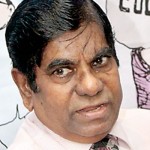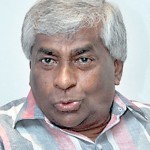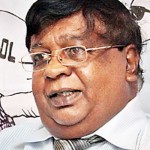Sri Lanka moving away from a market economy to state-driven with handouts – Budget 2015
While the budget to some extent focuses on export growth, there was lack of coherence and contained populist measures aimed at impending elections, it was revealed at a panel discussion on the budget yesterday.

Thilak Godamanna
Tilak Godamanna, Senior Deputy President of the National Chamber of Commerce (NCC) said the budget was a development oriented one aimed at wooing investors. He agreed that the concessions were unprecedented but added that it covered all sectors and was based on pre-budget consultations with all business groups.
He was among a group of panelists which included Prof. Sirimevan S. Colombage, a well-known economist and Anton Marcus, a reputed union leader at the discussion organized by the Business Times at its office auditorium.
Mr. Marcus however said the budget is clearly targeted at the Presidential election and cannot be considered a ‘normal’ budget. “It’s ‘clear’ that it’s an election budget. After January we must see whether all this is as true as it

Anton Marcus
sounds,” he said.
“There’s no plan. It’s akin to Santa Claus handing over goodies,” he pointed out.
This budget, specifically the concessions were given because of the Uva results where the ruling party vote base dropped by 21 per cent. Even in the postal votes the government lost, he said stressing that this is why the government has given more concessions to the public sector.
Prof. Colombage noted that there is no coherent macroeconomic plan in the budget. “We have major economic problems and economic setbacks during the past 25 years. Overall we cannot be happy about economic growth. And this (aspect) is not addressed in the budget,” he added.
He agreed that exports are growing but pointed out that that Sri Lanka should go for high tech exports and reduce dependence on traditional products like commodities and garment. “There is set back in the technological growth. There is a gap. There is little achievement in the

Prof. S.S. Colombage
knowledge economy.”
On the fiscal deficit, he said while there are popular proposals like low interest rates for elders, incentives and a salary hike for state workers, Sri Lanka seems to be moving away from a market economy. “The Government gives incentives and thereby creates market distortions. During the last few years we are moving away from the market economy and now more in the controlled economy sector,” he said.
“I cannot see any revenue growth and even next year’s revenue is same. There would only be a marginal increase. Government has to harness additional revenue. Government need to borrow to finance debt repayments and interest. Government expenditure will go up as a result of concessions,” he said.
Responding to questions, Mr. Godamanne said he believed the budget is not an election-oriented one and what the government is planning to do is pass the economic development benefits to all sections of the society.
Referring to private workers salary issue, he said that there was a dearth of skilled workers and the wages of workers are determined by market forces.
Citing an example, he said that construction sector workers are earning a sum of around Rs.1, 500 per day. He noted that if Sri Lanka imports foreign labour then the wages of local workers will also rise to be on par with foreign workers. Answering a question on concessions given to migrant workers, he said that the 60 per cent incentive given to migrant workers to import vehicles will motivate them to make more remittances and savings in the country.
However others argued that this proposal could lead to misuse and sale of vehicle permits for a sector that has more than a million workers.
When asked to explain as to why the revenue proposals were not included in the presentation, Prof. Colombage noted that some of the details were in technical notes of the budget but the revenue was just sufficient to service the debt and interest. He revealed that according to technical notes the total expected revenue from budget proposals is Rs. 65,500 million and the current expenditure is roughly Rs.95,000 million, revealing a huge gap between the revenue and expenditure.
Responding to another question, Mr. Marcus said that there is a mismatch in the wage structure. For example, workers in the export industry should get far more than others as this industry earns a lot. But even a betel shop owner pays the same minimum wage as a big time exporter to his employees. There’s a fundamental flaw here, he added.
He and Prof. Colombage also agreed that GDP should be taken in a holistic way vis-à-vis the quality of life. For example rising crimes, growing corruption and repeated cases of child incest by parents reveal a serious problem in society which needs to be addressed as part of GDP growth.


